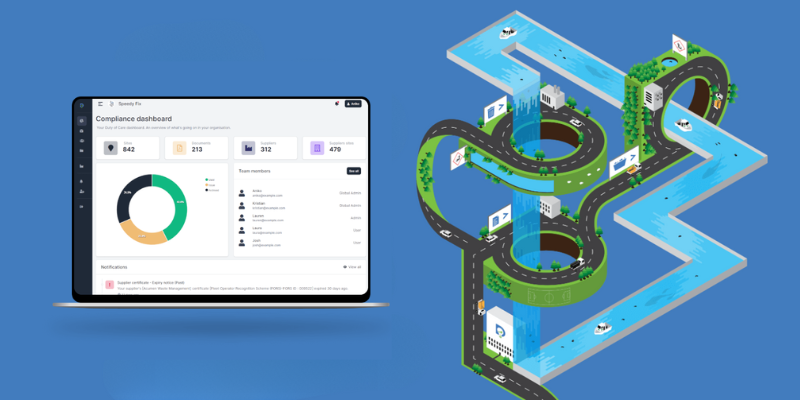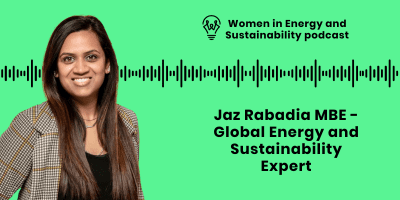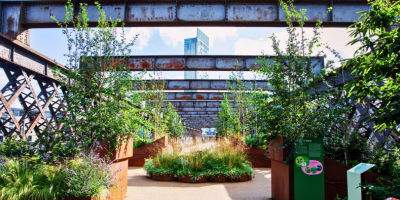Sophie Walker is the co-founder of Dsposal, a waste management software company based in the UK. With a background in environmental consultancy, Sophie is committed to making waste management more efficient and sustainable. Under her leadership, and that of her fellow co-founder, Dsposal has revolutionised the industry with innovative solutions for waste tracking and compliance.
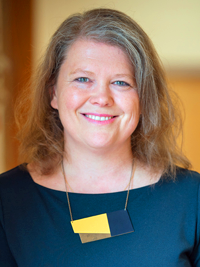
“Waste is something that every single one of us creates but very few of us understand.”
An unconventional education
I was born in rural Tamil Nadu in south India and moved to rural Devon when I was six. I went to the village primary school, which was a bit of a shock compared to my existence in India. For secondary school, I was really lucky to have gone to The Small School, in Hartland, which was what I semi-jokingly refer to as a “hippy school”, which both my parents worked at (and the reason we moved to Devon) and was founded by Satish Kumar.
The mornings were academic subjects, the afternoons were all creative or practical. The kids all cleaned the school each day. Two of the kids made lunch for the rest of the school every day too and it focussed on a much more holistic education than what you typically got in a comprehensive. When I was there, I think it was at its biggest, with around 40 pupils (aged 11-16).
After school, I went to college and chose psychology, biology and geography A-Levels but I quit after a year as I wanted to go travelling to train as a scuba diving instructor. I travelled on and off for a few years, working in an amazing family-run yoghurt and ice cream factory in Devon, saving up and then going away for a few months at a time.
Giving peace a chance
I went to Australia a couple of times with short stop-offs in Japan and Thailand, and I went back to India a couple of times. On one of these trips, I read about a Master’s Degree in Conflict Resolution at the University of Bradford’s Department of Peace Studies and International Development. I applied for a BA in Development and Peace Studies and was rejected but I was told if I did some sort of academic course to prepare, I’d be accepted.
I then did an Open University course, reapplied and started my degree in 2005 as a mature student. I ended up switching to Conflict Resolution as my degree as the lecturer was AMAZING. Then I got a nasty injury in my final year, which meant I didn’t graduate with the rest of my class.
Wyld life
I’d met and got together with my now fiancé and co-founder Tom at uni and we moved to Monkton Wyld Court, in Dorset, to volunteer while we figured out “what’s next?” It was a sustainable education centre run by an intentional community with a beautiful old Victorian Gothic rectory, set amongst 11 acres of land, including an orchard and a one-acre walled vegetable garden.
We ended up staying for more than a year, I took the role of catering manager and Tom was on the maintenance team. It was hard work, but also rewarding, interesting and in beautiful surroundings. We often say that going to Monkton inoculated us against consumerism. We had so little disposable income, at a time when most of our university friends were getting their first graduate jobs and earning more than £20k, we had less than £500 a month between us, though all our rent, food and utilities were covered.
After Monkton, but still in Dorset, I got other jobs in hospitality and catering and Tom got his first job in waste as a recycling advisor with West Dorset District Council, but with limited opportunities in Dorset, we chose to move to Sheffield, where some of our uni friends were. Tom got more jobs in waste, another council job and then with a hazardous waste management company. I got into logistics and supply chain.
We’d decided we wanted to work for disaster relief agencies, like Médecins Sans Frontières, and needed to get at least two years’ relevant work experience then travel experience. I had it already but Tom had never been anywhere apart from on a two-week holiday. Our plan for this was a two-year cycle tour of the Americas.
Co-founding Dsposal
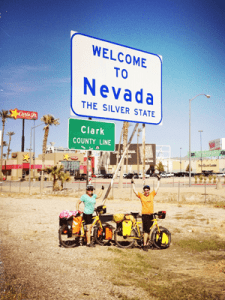
Tom found the lack of a definitive goal and mental stimulation hard, but he used all that time in the saddle to think about his previous jobs in waste, his love of tech and how he might put them together to solve the problems he’d experienced. That’s when the idea for Dsposal was born. We asked his old colleagues if they thought it was a good idea and were told: “Yeah, but it already exists”, so Tom tried to find the company doing it as that’s who he wanted to work for. But it turns out that it didn’t exist, so people told us we should do it, and being a bit reckless, we did!
Initially, I wasn’t really going to be involved, just help a bit with some admin, but it’s a fascinating world and I got sucked in. Neither of us is what you might call your ‘typical’ entrepreneur and we had no real desire to start a company. It was a steep learning curve, and still is really, but we’re coming up to our 8th birthday, though in many ways our official ‘launch’ feels more like the start, which was March 2018.
The real circular economy
Waste is something that every single one of us creates but very few of us understand. Whilst the world has woken up to the problem of plastic pollution, we continue to make and dispose of an increasing mountain of stuff, but we have very little data and information about this stuff once it ends up in our bins.
We are proponents of the circular economy, the ‘real’ circular economy that entails shifting to a regenerative and redistributed economic model, learning from and mimicking nature, using less stuff for longer and ensuring all our stuff can be food for another part of the system.
To do this we need to understand all the materials that are flowing through our economies and supply chains, both as stuff people buy and sell and once it ends up as waste, but we also need to challenge the status quo in terms of business as usual, the obsession with growth, the inherent inequalities and exploitative nature of consumerist capitalism.
Our focus is on developing software and data systems that help us to better understand material flows, help businesses to more easily meet their regulatory requirements and hopefully make more sustainable choices. We try to make sure that we’re working towards the future we need in all aspects of our business, whether that’s how we’re funded, how we treat our staff, or how we work with clients and partners.
Innovate UK Women in Innovation Award
I was part of the 2020-21 cohort of 40 women for the Innovate UK Women in Innovation Award. My project was to develop our compliance software so it could better support NHS Trusts with their challenges around managing their waste contracts, understanding their waste and gathering better data. We worked with Manchester University NHS Foundation Trust, the largest in the country, and they use the software to this day.
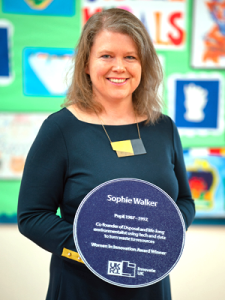
Using tools to drive progress towards sustainability
When it comes to the UN Sustainable Development Goals, I think anything that can help us think more holistically and systemically about the challenges we face as humanity is really useful. I’m a particular fan of Kate Raworth’s Doughnut Economics model which helps us to balance living within the very real physical planetary boundaries with making sure that we are meeting everyone’s basic needs and no one is falling through the ‘hole’ in the middle.
The current economic model isn’t fit for purpose and is literally destroying the living systems we are part of and rely on to survive on this planet, but it’s such a powerful frame that we seem to believe it is more important and immutable than the laws of physics and nature. So we need new frames, and new narratives to help us imagine new ways of doing things that allow us all to thrive, while also enabling us to steward this only known living planet for all living things.
We need to embrace new ways to live
The biggest challenge we face is our devotion to ‘the economy’ and trying to bolt on solutions to a fundamentally destructive system that cannot support a sustainable way forward. I think that is why we end up focusing on single-issue areas – like NetZero (which generally boils down to electric vehicles and renewable energy) or the circular economy (when all we really mean is recycling on steroids) or even climate change (when we just focus on carbon emissions).
We are part of an intricate, complex, interdependent system of systems and we need to find systemic solutions not just focus on one area. For example, renewable energy is awesome, but for us to continue to consume energy at the levels we are and which are projected to continue to rise we would need more rare earths and materials than the Earth contains to make all the infrastructure we would need so we need to reduce our energy appetite.
Even if we were to extract all the rare earth elements the world has to offer, what environmental cost would that come with and what knock-on effects to other systems would that create – like pollution, loss of habitat and biodiversity? So, we need to embrace new ways to live. I think most of us can agree that while there are certain aspects of modern life which are amazing and better than humanity has ever had it in our short history, there are a lot of things that don’t work and that could be better. Crises force change and there is an opportunity here for us to reimagine a world we want, in which all living things thrive.
Advice for entrepreneurs who are keen to drive innovation for sustainability
I think these days I’d give four bits of advice to people wanting to drive innovation for sustainability:
- Understand the problems and how they are interconnected. Innovation isn’t just about shiny tech, it comes in all forms – think about your business model, think about your governance, think about the way you operate in your ecosystem and how you can contribute to making it a thriving space for everyone in it.
- Challenge the traditional funding models, there are some really interesting developments happening in this space so don’t feel like you need to go down the ‘normal investment’ path – if you want to work towards a sustainable future I think it is incredibly difficult to balance that mission with the priorities of typical investors and venture capital, and I think that is part of the problem, so don’t go down that route, explore the alternative funding models that are springing up or come up with your own.
- Collaborate! These are enormous challenges that aren’t going to be solved by a single solution or company, so work with everyone you can who is pushing in the same direction. Solving the problems we face is a much bigger reward than a fat pay cheque or getting credit for being ‘the’ hero who came up with the solution.
- Look after yourself. This is exhausting work that can leave you burnt out and demoralised. Practice self-care, find others who you feel a kinship with for support and camaraderie, and celebrate your wins.
Coming up next
For the business, the thing I am most excited about is the work we’re doing on understanding material flows before stuff ends up in the bin. We’ve been working on packaging, but we’re now looking at taking the same approach and seeing if we can apply it to other ‘stuff’ too.
I’m also looking forward to the rollout of mandatory digital waste tracking in the UK in 2025 and helping our SME waste management clients to make the most of this new regulation.
I have signed up to do All Points North at the end of May. It’s a self-supported ultra-cycle ride starting and ending in lovely Sheffield, with ten checkpoints around the North of England and a total route of around 600 miles. I’m slightly terrified, but also really excited about pushing myself physically and seeing where the edge of my endurance is!

